Lesson_4_The_Invisible_Japanese_Gentlemen
the invisible Japanese gentleman

7. The woman thought the man was not able to discuss the issues in quesiton, unable to be i n pace with her in thinking although they were together as fiance and fiancee. The man was like a useless decoration to her because he was not able to think logically --- a criticism men often use when they talk about some mindless beauty, or the blondes as plastic bimbos, a decorative beauty.
8. The author may want to show how blind the woman was in contrast to her claim of her powers of observation. He presents a detailed description of the Japanese guests from time to time as an incongruous ( out of place ) , conspicuous (remarkable ) group of people in this situation. But in spite of this, this woman still failed to notice them. This technique of writing greatly enhanced his purpose to contrast what one believes on can do and what one can acturally do in life.
新版标准日本语初级上册 第4课

第四課 部屋に机といすがあります 生词表部屋へや 庭にわ 家いえ 居間いま 冷蔵庫れいぞうこ 壁かべスイッチ 本棚ほんだな ベッド 猫ねこ 犬いぬ 箱はこ 眼鏡めがねビデオ サッカーボール ビール ウイスキー子供こども 兄弟きょうだい 両親りょうしん 妹いもうと 男おとこ 女おんな 生徒せいと 上うえ 外そと 中なか 下した 前まえ 後うしろ 近ちかく場所ばしょ 教室きょうしつ 会議室かいぎしつ 図書室としょしつ 公園こうえん 花屋はなや 売店ばいてん 駅えき 地下鉄ちかてつ 木き 一人暮ひとりぐらし あります いますええと横浜よこはま 名古屋なごや 大阪おおさか J R ジェーアールご语法1.肯定:场所に无生命的物体(不动)があります 场所に有生命的物体(动)がいます“某处有某人(物)”「に」是格助词,表示存在场所;「が」时格主次,表示存在的主体.○部屋に机があります。
○ここに本があります。
○部屋に猫がいます。
○公園に子供がいます。
練習:(1)桌上有笔记本.(2)教室里有学生.(3)院子里有狗.(4)冰箱里有啤酒.P58 练习1否定:ありません/いません一般疑问句场所に无生命的物体(不动)がありますか。
场所に有生命的物体(动)がいますか。
P59 练习5特殊疑问句场所に何がありますか。
场所にだれがいますか。
○庭に何がありますか。
○あそこにだれがいますか。
練習:(1)教室里有谁?(2)房间里有什么?P58 练习32.肯定:无生命的物体(不动)は场所にあります有生命的物体(动)は场所にいます“某人(物)在某处”「は」是提示助词,提示主题,提示存在的东西;「に」是格助词,表示存在场所.○いすは部屋にあります。
○本はここにあります。
○吉田さんは庭にいます。
○子供は公園にいます。
練習:(1)孩子在公园里.(2)录像机在起居室里.否定:ありません/いません一般疑问句无生命的物体(不动)は场所にありますか。
有生命的物体(动)は场所にいますか。
小学上册第三次英语第五单元测验卷
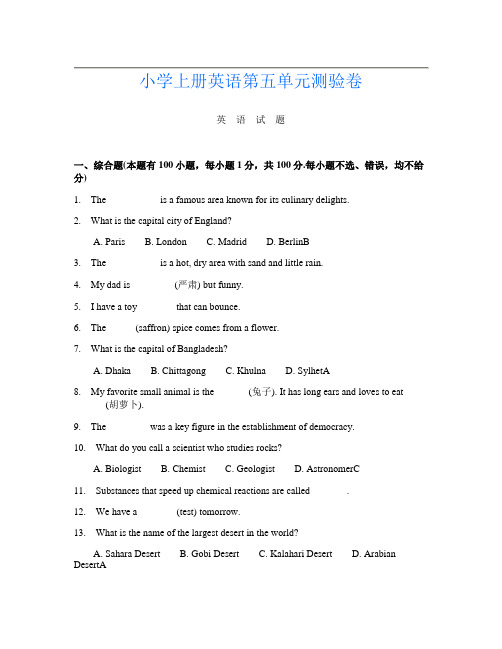
小学上册英语第五单元测验卷英语试题一、综合题(本题有100小题,每小题1分,共100分.每小题不选、错误,均不给分)1.The __________ is a famous area known for its culinary delights.2.What is the capital city of England?A. ParisB. LondonC. MadridD. BerlinB3.The __________ is a hot, dry area with sand and little rain.4.My dad is ________ (严肃) but funny.5.I have a toy _______ that can bounce.6.The _____ (saffron) spice comes from a flower.7.What is the capital of Bangladesh?A. DhakaB. ChittagongC. KhulnaD. SylhetA8.My favorite small animal is the ______ (兔子). It has long ears and loves to eat______ (胡萝卜).9.The ________ was a key figure in the establishment of democracy.10.What do you call a scientist who studies rocks?A. BiologistB. ChemistC. GeologistD. AstronomerC11.Substances that speed up chemical reactions are called _______.12.We have a _______ (test) tomorrow.13.What is the name of the largest desert in the world?A. Sahara DesertB. Gobi DesertC. Kalahari DesertD. Arabian DesertA14.The process of changing from a liquid to a solid is called _______.15. A ______ (植物的生态监测) can provide valuable data.16.The scientist, ______ (科学家), conducts important experiments.17.What is the name of the famous clock tower in London?A. Big BenB. Eiffel TowerC. ColosseumD. Statue of LibertyA18.She _____ (enjoy/enjoys) dancing.19.The sun is very ___ (warm) today.20.What do we call the invisible force that pulls objects toward each other?A. MagnetismB. GravityC. FrictionD. Electricity21.What do we call the area of land that is home to a specific species?A. HabitatB. EcosystemC. BiomeD. NicheA Habitat22.What is the name of the first person to walk on the moon?A. Yuri GagarinB. Neil ArmstrongC. Buzz AldrinD. John Glenn23.The butterfly rests on a ______ (花).24.What is the capital of Saint Vincent and the Grenadines?A. KingstownB. Arnos ValeC. CalliaquaD. GeorgetownA25.I am excited to join the school ________ (合唱团) and sing with my friends.26.What is the main food for a rabbit?A. MeatB. GrassC. CarrotsD. FishC27. A ______ is a tool used to observe chemical reactions.28.The Andromeda Galaxy is the nearest ______ to the Milky Way.29.I have a ________ that sings.30.What is the main gas we breathe?A. OxygenB. Carbon DioxideC. NitrogenD. HydrogenA31.Frogs have smooth, ________________ (湿润) skin.32.Sound travels faster in ______ than in air.33.What is the first month of the year?A. FebruaryB. MarchC. JanuaryD. December34.Which bird is known for its colorful feathers?A. SparrowB. PeacockC. PenguinD. CrowB35.What do we call the area of land that is very dry and gets little rain?A. DesertB. ForestC. SwampD. PrairieA36.At the pet shop, I saw a _______ (小仓鼠) running in a wheel.37.My aunt loves to volunteer at the ____ (shelter).38.We learned about plants in ________ class.39.What do we call the study of living things?A. ChemistryB. BiologyC. PhysicsD. Astronomy40.My brother loves to __________ (参加) family celebrations.41.Which fruit is known for having seeds on the outside?A. StrawberryB. RaspberryC. BlackberryD. BlueberryA42. A lunar eclipse occurs when the Earth passes between the sun and the ______.43.What do we call the stars that appear during the day?A. SunB. MoonC. CometD. PlanetA44.What is the capital of the Solomon Islands?A. HoniaraB. SuvaC. TarawaD. FunafutiA Honiara45.The horse is ________ (美丽的).46.What is the term for an animal that eats both plants and meat?A. HerbivoreB. CarnivoreC. OmnivoreD. InsectivoreC47.My favorite animal is a ______ (小狗). It loves to play and run around the ______ (公园).48.The __________ is a large city in China known for its skyline. (上海)49.I can _____ my shoes by myself. (put on)50.The ________ (project) addresses key issues.51.I have a ___ (story) to share.52.The ________ grow in the garden.53.Which animal is known for its long tail?A. ElephantB. MonkeyC. DogD. CatB54.She likes to _____ (swim/climb).55.Which body of water is the largest on Earth?A. RiverB. LakeC. OceanD. Pond56.I enjoy watching the __________ in the sky at night. (星星)57.What is the term for a tree that loses its leaves in the winter?A. EvergreenB. DeciduousC. ConiferousD. TropicalB58.What is the name of the largest land animal?A. RhinoB. ElephantC. HippoD. Giraffe59.The _____ (果树) is full of ripe fruit.60.The __________ (种植计划) should be well thought out.61.The process of separating solids from liquids using a filter is called ______.62.Most gases are ______ at room temperature.63.What do we call the process of taking in oxygen and releasing carbon dioxide?A. RespirationB. PhotosynthesisC. DigestionD. FermentationA64.What is the name of the famous American singer known for "Billie Jean"?A. Michael JacksonB. PrinceC. UsherD. Justin TimberlakeA65.What is the sum of 9 and 10?A. 18B. 19C. 20D. 21B66.What is the tallest mountain in the world?A. K2B. KilimanjaroC. EverestD. DenaliC67. A __________ is a tool used to measure earthquakes.68.What do we call the soft material that covers the ground in a forest?A. SoilB. SandC. GrassD. MossD69. A chemical bond holds _______ together in a molecule.70.My pet rabbit loves to dig in the ______ (土壤).71.What is the name of the famous scientist known for his work on the nature of light?A. Isaac NewtonB. Albert EinsteinC. James Clerk MaxwellD. Thomas YoungA72.What is the capital of the Solomon Islands?A. HoniaraB. GizoC. MalaitaD. MakiraA Honiara73.I like to spend time with my family during ________ (假期) and enjoy special meals together.74.Which insect can produce honey?A. AntB. ButterflyC. BeeD. FlyC75.The river is ________ (清澈).76.The chemical formula for butyric acid is ______.77.Neutralization reactions occur between acids and _____ (bases).78.The chef presents exquisite _____ (菜肴) in his restaurant.79.What do we use to tell time?A. CalendarB. ClockC. MapD. ThermometerB80.I can ___ my bike. (ride)81.My favorite hobby is ______. I started this hobby when I was ______ years old. It is something that makes me feel very ______ and relaxed.82.What is the opposite of ‘true’?A. RealB. FalseC. CorrectD. Right83. A ______ has a symbiotic relationship with flowers.84.The stars are ___ (twinkling) in the sky.85.What is the name of the imaginary line that divides the Earth into Eastern and Western Hemispheres?A. EquatorB. Prime MeridianC. Tropic of CancerD. Tropic of CapricornB86.The capital of Uganda is ________ (坎帕拉).87.The cake is ______ (delicious)!88.What is the opposite of ‘long’?A. TallB. ShortC. WideD. Narrow89.What do we call the act of identifying problems?A. DiagnosisB. AssessmentC. EvaluationD. All of the AboveD90.What do we call a story that is passed down through generations?A. MythB. LegendC. FableD. Tale91.The wolf howls at the _________ (月亮).92.I have a toy ________ that I built.93.My favorite season is ______ (夏天).94.The _______ is a measure of how much solute is in a solution.95.Which sport is played with a bat and ball?A. BasketballB. SoccerC. BaseballD. TennisC96.Metalloids have properties of both _____ and nonmetals.97.I feel ______ when I play sports.98.The first nuclear power plant opened in _______.99.The ________ was a major event that shaped modern European history. 100.The ________ is very gentle and caring.。
the invisible Japanese gentlemen译文

The Invisible Janpanese Gentlemen过目不见日本人八位日本绅士正在本特利餐馆享用鱼餐。
他们偶尔用一种让人难以理解的语言相互交谈,并总是报以礼貌的微笑,还不时地微微躬身致意。
除一个人外,其他七个人都戴着眼镜。
坐在远处窗户边的漂亮姑娘间或扫他们一眼,但她自己的事情似乎太重要了,除了她自己和同伴外,她谁也无暇顾及。
她有着一头并不浓密的金发,好看的鹅蛋脸有着摄政时期流行的那种娇小玲珑的美丽,就像一幅微型画。
只是她说话有点刺耳——这也许是她刚毕业离开的罗丁或者是切尔滕纳姆女子学院的口音吧。
她左手中指上戴着一枚男式文章戒指。
我在一张餐桌旁坐下,和他们之间隔着那8位日本绅士。
这时就听她说:“你看,咱们下周就可以结婚了。
”“是吗?”她的同伴显出些许不安。
他往杯子里添了点夏布利酒,说:“当然可以,可我妈……”我没听见他们下面的谈话,因为这时餐桌旁最年长的日本绅士微笑着鞠了一躬,欠着身说了老长一段话。
他的讲话就像大鸟笼子里传出的叽喳声。
其余的人都朝他探着身子,面带笑容听他讲述。
我自己也禁不住想听他在说些什么。
姑娘的未婚夫外表和她很像。
我可以想象出他俩像两幅微型画似的并排挂在白木护壁板上。
他或许可以成为纳尔逊海军部队里的一名年轻军官。
在纳尔逊那个时代,有些文弱、有些敏感并不会成为晋升的障碍。
她说:“他们要预付给我500英镑的版税,而且已经把平装本的版权卖掉了。
”这么直白的商人口吻令我震惊;我感到震惊还因为她居然是我的同行。
她最多不过20岁,应该享受更好的生活。
“我明白了。
”他心不在焉地用叉子搅动着夏布利酒——也许订婚前他都是买香槟的吧。
日本绅士们此时已用完鱼餐,正向那位中年女服务员点一道鲜果沙拉,他们的英语说得很不地道,态度却谦恭有加。
姑娘看了他们一眼,又朝我这边看看,但我想,她眼里只有未来。
我很想告诫她,不要把未来寄托在第一本叫《切尔西的名流》的小说上。
我同意他母亲的观点。
这是个令人羞愧的想法,但我可能跟她母亲的年龄差不多。
日语第四课

昨日は 29日 でした. 第4课 昨日は6月 29日 でした.
(3) 田中: ございます. 田中: おはよう ございます. ございます. 王 : おはよう ございます. 次(つぎ)の バスは 何分(なんぷん)ですか. つぎ) 何分(なんぷん)ですか. 田中: 15分 しちじじゅうごふん)です. 田中:7时15分(しちじじゅうごふん)です. 学校は 何时(なんじ) はじ)まりますか. 王さんの 学校は 何时(なんじ)に 始(はじ)まりますか. くじ) はじ)まります. 王 : 9时(くじ)に 始(はじ)まります. 田中さんの 会社は 何时(なんじ)からせすか. 田中さんの 会社は 何时(なんじ)からせすか. 田中:わたしの 会社も 9时にからです. 田中: 会社も にからです. 明日(あす) 土曜日(どようび)です. 明日(あす)は 土曜日(どようび)です. 学校(がっこう) やす)みですか. 明日 学校(がっこう)は 休(やす)みですか. いいえ, やす) ありません. 王 : いいえ,休(やす)みでは ありません. 田中:夏休(なつやす) いつまでですか. 田中:夏休(なつやす)みは いつから いつまでですか. 王 :7月15日(しちがつじゅうごにち)から 15日 しちがつじゅうごにち) 31日 はちがつさんじゅういちにち)までです. 8月31日(はちがつさんじゅういちにち)までです.
句型, 法解说 句型,语法解说
6. 何时に 始まりますか 何时からですか 何时に まりますか/ 何时からですか 这两句的意思大致相同. 两句的意思大致相同. 王さんの学校は 何时に 始りますか. さんの学校 学校は 何时に りますか. 王さんの学校は 9时に 始ります. さんの学校 学校は ります. 王さんの学校は 何时からですか. さんの学校 学校は 何时からですか からですか. 王さんの学校は 9时からです. さんの学校 学校は からです.
日语泛读第4课PPT(外研社)

単語の説明
痛めつける:<人>をひどい目に遭わせる。
〇水害に痛めつけられた地方 〇ボクシングで相手を乱打して、さんざん痛めつける。 〇弱点を突いて相手を痛めつける。
単語の説明
金遣い:金の使い方。金を使う程度。 荒い:節度がない。 湯水のようにつかう(金などを)湯と水を使うように惜しげも
単語の説明
痛感:心に強く感ずること。身にしみて感じること。 とうてい:下に打ち消しの語を伴って、どんなにしても。ど
うしても。
本邦(ほんぽう):我が国。 遥か:副詞的に、距離・時間の非常に隔たっているさま。
単語の説明
真裸(まはだか):文語。真っ裸(まっぱだか)
何も身に着けていないこと。全くの裸。
なくつかう。濫費する。
単語の説明
‐あたり:接尾語。「一」または単位を表す語に付いて、
「...につき」「...に対して」の意を表す。 0一人あたり三枚ずつ配る 0一日あたりの生産高 0キロあたり八百円
単語の説明
相関知識
世界でも多雨地帯であるモンスーンアジアの
東端に位置する日本は、年平均1718mmの降 水量があり、これは世界平均(880mm)の約2倍 に相当する。しかも、日本の降水量は季節ごと の変動が激しく、梅雨期と台風期に集中して いる。例えば東京の月別平均降水量は、最多 雨月の9月で208.5mm、最少雨月の12月で 39.6mmと、その差は5倍に達する。
ぽかんと:ぼんやりするさま。
第課
日本の水資源
単語の説明
きつねにつままれる (慣用句)
意味
注釈
用例
どうしてそうなったか、わけがわからない状態にな ること。 「つままれる」は「化かされる」こと。狐に化かされ たときのように、原因や道理がわからないで不思議 な状態になることから。 突然大勢の人の訪問を受けて、夫人は狐につま まれたような顔をしている。
みんなの日本语第4课

みんなの日本語第4課文型1今~時~分です。
~時半/午前・午後〈導入〉T:(教室の時計を外して2時にセット)今、何時ですか。
(「時間」の後で「分」も確認、その後で「半」) T:(時計を伏せて、腕時計を見る)今、何時ですか。
〈練習1〉教科書の練習B-1T:今、何時ですか。
(リピート→絵を見せる)〈練習2〉教科書の練習B-2T:東京は今、何時ですか。
S:午後6時です。
文型2~は~時から~時までです。
導入〉T:(授業の時間割を見せながら)今、授業です。
:授業は(2時のところを指して)…S:授業は午後2時からです。
T:(4時のところを指して)S:授業は午後4時までです。
【__は__じからです。
】【__は__じまでです。
】T:(2時から4時までを指して)S:授業は午後2時から午後4時までです。
【__は__じから__じまでです。
】〈練習1〉営業時間を書いた紙を貼る〈導入〉曜日T:月曜日、火曜日‥(コーラス)T:今日は…S:水曜日です。
〈練習2〉T:今日は何曜日ですか。
(あした、あさって)S:~曜日です。
(コーラス)〈練習3〉T:仕事は何時から何時までですか。
:仕事は何曜日から何曜日までですか。
:この授業は何時までですか。
〈練習4〉教科書の練習C-1文型3私は~時にVます。
〈導入〉T:(絵カードV-1)朝…S:朝、起きます。
〈練習1〉T:(絵カードV-5)夜(毎日・明日・朝・毎晩)(導入)T:8時…8時に勉強します。
【まいにちべんきょうします。
】【8じに】【にちようび(に) 】〈練習2〉教科書の練習B-5〈練習3〉(10時・7時・水曜日・毎朝・9時・日曜日)(導入)T:7時から9時まで…7時から9時まで勉強します。
【_じから_9じまで勉強します。
】(練習4)(8時から10時まで・6時から11時まで)〈練習5〉教科書の練習C-2文型4Vません。
〈導入〉T:(絵カードV-5)(×を貼る)S:勉強しません。
新视界大学英语 4 课文翻译
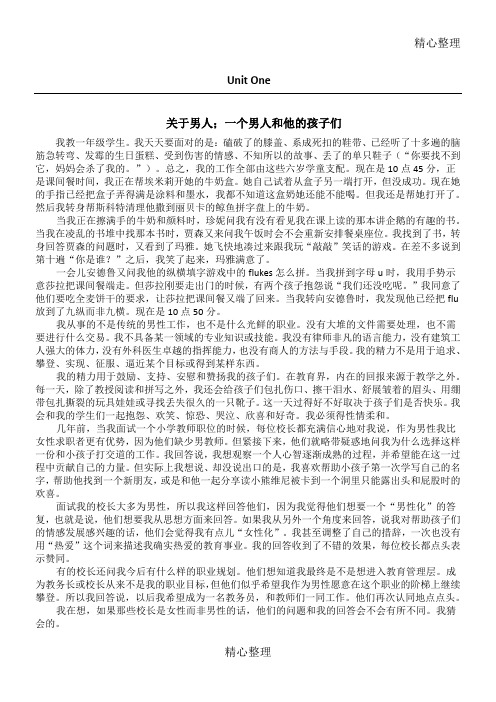
精心整理Unit One关于男人;一个男人和他的孩子们我教一年级学生。
我天天要面对的是:磕破了的膝盖、系成死扣的鞋带、已经听了十多遍的脑筋急转弯、发霉的生日蛋糕、受到伤害的情感、不知所以的故事、丢了的单只鞋子(“你要找不到它,妈妈会杀了我的。
”)。
总之,我的工作全部由这些六岁学童支配。
现在是10点45分,正是课间餐时间,我正在帮埃米莉开她的牛奶盒。
她自己试着从盒子另一端打开,但没成功。
现在她的然转flu放我喜。
也就是说,他们想要我从思想方面来回答。
如果我从另外一个角度来回答,说我对帮助孩子们的情感发展感兴趣的话,他们会觉得我有点儿“女性化”。
我甚至调整了自己的措辞,一次也没有用“热爱”这个词来描述我确实热爱的教育事业。
我的回答收到了不错的效果,每位校长都点头表示赞同。
有的校长还问我今后有什么样的职业规划。
他们想知道我最终是不是想进入教育管理层。
成为教务长或校长从来不是我的职业目标,但他们似乎希望我作为男性愿意在这个职业的阶梯上继续攀登。
所以我回答说,以后我希望成为一名教务员,和教师们一同工作。
他们再次认同地点点头。
我在想,如果那些校长是女性而非男性的话,他们的问题和我的回答会不会有所不同。
我猜会的。
还有一些时候,我去参加聚会或宴会。
当我告诉别人我教小孩子时,我发现男人和女人的反应不尽相同。
大部分男士会问我所教的科目和我所学过的课程。
然后,除非他们提起诸如奖金之类的话题,我们的谈话就此结束。
然而,我和大多数女士的谈话会更直接,并且她们会谈到自身的经历。
她们会说:“孩子们肯定喜欢有一位男老师”或“那个年纪的孩子太有意思了,你肯定喜欢你的工作。
”然后,她们通常就会谈起自己的孩子,或者问一些有关我工作的具体问题。
我们就此展开话题,谈论与教学相关的事情。
如果我的工作在福利待遇方面更像传统的男性工作的话,或许我和男士们之间的话会更多一些。
但我没有奖金与升职机会,没有棒球场正面看台上的免费座位,下班回家没有的士补助,下班后没有一起喝酒的哥们儿,没有公文包,没有西装(因为领带会卡到颜料瓶里),没有商务午餐(我和孩子们一起吃花生酱和果酱三明治、薯条、牛奶和饼干),也不会带客户参加鸡尾酒会。
the invisible Japanese gentlemen译文讲课教案

t h e i n v i s i b l e J a p a n e s eg e n t l e m e n译文The Invisible Janpanese Gentlemen过目不见日本人八位日本绅士正在本特利餐馆享用鱼餐。
他们偶尔用一种让人难以理解的语言相互交谈,并总是报以礼貌的微笑,还不时地微微躬身致意。
除一个人外,其他七个人都戴着眼镜。
坐在远处窗户边的漂亮姑娘间或扫他们一眼,但她自己的事情似乎太重要了,除了她自己和同伴外,她谁也无暇顾及。
她有着一头并不浓密的金发,好看的鹅蛋脸有着摄政时期流行的那种娇小玲珑的美丽,就像一幅微型画。
只是她说话有点刺耳——这也许是她刚毕业离开的罗丁或者是切尔滕纳姆女子学院的口音吧。
她左手中指上戴着一枚男式文章戒指。
我在一张餐桌旁坐下,和他们之间隔着那8位日本绅士。
这时就听她说:“你看,咱们下周就可以结婚了。
”“是吗?”她的同伴显出些许不安。
他往杯子里添了点夏布利酒,说:“当然可以,可我妈……”我没听见他们下面的谈话,因为这时餐桌旁最年长的日本绅士微笑着鞠了一躬,欠着身说了老长一段话。
他的讲话就像大鸟笼子里传出的叽喳声。
其余的人都朝他探着身子,面带笑容听他讲述。
我自己也禁不住想听他在说些什么。
姑娘的未婚夫外表和她很像。
我可以想象出他俩像两幅微型画似的并排挂在白木护壁板上。
他或许可以成为纳尔逊海军部队里的一名年轻军官。
在纳尔逊那个时代,有些文弱、有些敏感并不会成为晋升的障碍。
她说:“他们要预付给我500英镑的版税,而且已经把平装本的版权卖掉了。
”这么直白的商人口吻令我震惊;我感到震惊还因为她居然是我的同行。
她最多不过20岁,应该享受更好的生活。
“我明白了。
”他心不在焉地用叉子搅动着夏布利酒——也许订婚前他都是买香槟的吧。
日本绅士们此时已用完鱼餐,正向那位中年女服务员点一道鲜果沙拉,他们的英语说得很不地道,态度却谦恭有加。
姑娘看了他们一眼,又朝我这边看看,但我想,她眼里只有未来。
日语第四课

樱
花
(日本古谣) 日本古谣)
樱花啊 樱花啊 阳春三月天空里 万里无云多明净 如同彩霞如白云 芬芳扑鼻真美丽 快来呀 快来呀 同去看樱花 さくら
ざ行
ざ ザ za
じ ジ ji
ず ズ zu
ぜ ゼ ze
ぞ ゾ zo
ざザ ぜゼ ずズ ぞゾ じジ za zu zo ze ji
发音练习: 发音练习: ざぜじ じぜざ ざぜじずぜぞざぞ 例 词 1、じこ 、 1、ちず 、 0、かぜ 、 1、かぞく 、 [事故 事故] 事故 [地図 地図] 地図 [風] 風 [家族 家族] 家族
ざずぞ ずぞざ ざじずぜぞ
事故 地图 风 木材
(名) (名) (名) (名)
0、ざいもく [材木 、 材木] 材木
家族、 家族、家属 (名)
だ行
だ ダ da
ぢ ヂ ji
づ ヅ zu
で デ de
ど ド do
だダ どド でデ づヅ ぢヂ da do de zu ji
发音练习: 发音练习: だぢで ぢでだ どでぢづでどだど 例 词 1、だれ 、 1、まど 、 0、はなぢ 、 2、うで 、 [誰] 誰 [窓] 窓 [鼻血 鼻血] 鼻血 [腕] 腕
ห้องสมุดไป่ตู้
だづど づどだ だぢづでど
谁 水果 窗户 鼻血 胳膊
(代) (名) (名) (名) (名)
2、くだもの [果物 、 果物] 果物
ば行
ば バ ba
び ビ bi
ぶ ブ bu
べ ベ be
ぼ ボ bo
ばバ ぼボ ぶブ べベ びビ ba bu bo be bi
发音练习: 发音练习: ばびべ びべば ばべびぶべぼばぼ 例 词 1、ぶき 、 0、えび 、 0、かべ 、 0、ぶた 、 0、あぶら 、 [武器 武器] 武器 [蝦] 蝦 [壁] 壁 [豚] 豚 [油] 油
The invisible japanese gentleman ~~ theme
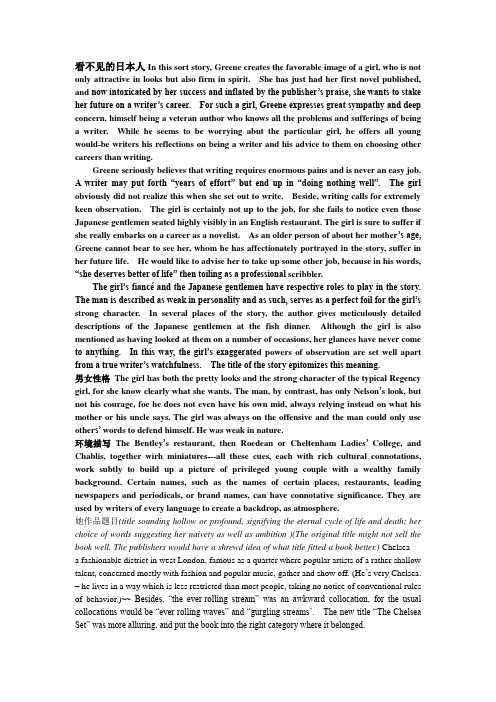
看不见的日本人In this sort story, Greene creates the favorable image of a girl, who is not only attractive in looks but also firm in spirit. She has just had her first novel published, and now intoxicated by her success and inflated by the publisher’s praise, she wants to stake her future on a writer’s career. For such a girl, Greene expresses great sympathy and deep concern, himself being a veteran author who knows all the problems and sufferings of being a writer. While he seems to be worrying abut the particular girl, he offers all young would-be writers his reflections on being a writer and his advice to them on choosing other careers than writing.Greene seriously believes that writing requires enormous pains and is never an easy job.A writer may put forth “years of effort” but end up in “doing nothing well”. The girl obviously did not realize this when she set out to write. Beside, writing calls for extremely keen observation. The girl is certainly not up to the job, for she fails to notice even those Japanese gentlemen seated highly visibly in an English restaurant. The girl is sure to suffer if she really embarks on a career as a novelist. As an older person of about her mother’s a ge, Greene cannot bear to see her, whom he has affectionately portrayed in the story, suffer in her future life. He would like to advise her to take up some other job, because in his words, “she deserves better of life” then toiling as a professional scri bbler.The girl’s fiancé and the Japanese gentlemen have respective roles to play in the story. The man is described as weak in personality and as such, serves as a perfect foil for the girl’s strong character. In several places of the story, the author gives meticulously detailed descriptions of the Japanese gentlemen at the fish dinner. Although the girl is also mentioned as having looked at them on a number of occasions, her glances have never come to anything. In this way, the girl’s exaggerated po wers of observation are set well apart from a true writer’s watchfulness. The title of the story epitomizes this meaning.男女性格The girl has both the pretty looks and the strong character of the typical Regency girl, for she know clearly what she wants. The man, by contrast, has only Nelson’s look, but not his courage, foe he does not even have his own mid, always relying instead on what his mother or his uncle says. The girl was always on the offensive and the man could only use other s’ words to defend himself. He was weak in nature.环境描写The Bentley’s restaurant, then Roedean or Cheltenham Ladies’College, and Chablis, together wirh miniatures---all these cues, each with rich cultural connotations, work subtly to build up a picture of privileged young couple with a wealthy family background. Certain names, such as the names of certain places, restaurants, leading newspapers and periodicals, or brand names, can have connotative significance. They are used by writers of every language to create a backdrop, as atmosphere.她作品题目(title sounding hollow or profound, signifying the eternal cycle of life and death; her choice of words suggesting her naivety as well as ambition )(The original title might not sell the book well. The publishers would have a shrewd idea of what title fitted a book better.) Chelsea --- a fashionable district in west London, famous as a quarter where popular artists of a rather shallow talent, concerned mostly with fashion and popular music, gather and show off. (He’s very Chelsea. – he lives in a way which is less restricted than most people, taking no notice of conventional rules of behavior.)~~ Besides, “the ever-rolling stream” was an awkward collocation, for the usual collocations would be “ever-rolling waves” and “gurgling streams’. The new title “The Chelsea Set” was more alluring, and put the book into the right category where it belonged.。
the invisible japanese gentleman读后感
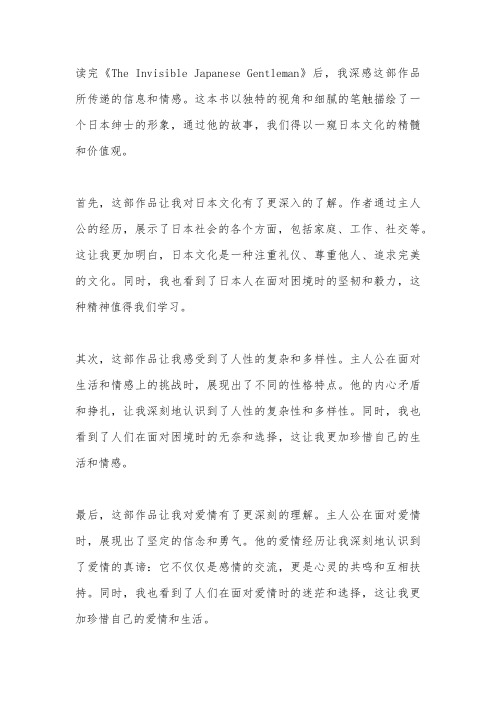
读完《The Invisible Japanese Gentleman》后,我深感这部作品所传递的信息和情感。
这本书以独特的视角和细腻的笔触描绘了一个日本绅士的形象,通过他的故事,我们得以一窥日本文化的精髓和价值观。
首先,这部作品让我对日本文化有了更深入的了解。
作者通过主人公的经历,展示了日本社会的各个方面,包括家庭、工作、社交等。
这让我更加明白,日本文化是一种注重礼仪、尊重他人、追求完美的文化。
同时,我也看到了日本人在面对困境时的坚韧和毅力,这种精神值得我们学习。
其次,这部作品让我感受到了人性的复杂和多样性。
主人公在面对生活和情感上的挑战时,展现出了不同的性格特点。
他的内心矛盾和挣扎,让我深刻地认识到了人性的复杂性和多样性。
同时,我也看到了人们在面对困境时的无奈和选择,这让我更加珍惜自己的生活和情感。
最后,这部作品让我对爱情有了更深刻的理解。
主人公在面对爱情时,展现出了坚定的信念和勇气。
他的爱情经历让我深刻地认识到了爱情的真谛:它不仅仅是感情的交流,更是心灵的共鸣和互相扶持。
同时,我也看到了人们在面对爱情时的迷茫和选择,这让我更加珍惜自己的爱情和生活。
总之,《The Invisible Japanese Gentleman》是一部非常优秀的作品,它让我对日本文化、人性、爱情有了更深入的了解和思考。
我相信这部作品会对我未来的生活和情感产生深远的影响。
Janpanese

第1课りゅうがくせい(留学生)〔名〕留学生きょうじゅ(教授)〔名〕教授しゃいん(社員)〔名〕职员かいしゃいん(会社員)〔名〕公司职员てんいん(店員)〔名〕店员けんしゅうせい(研修生)〔名〕进修生きぎょう(企業)〔名〕企业だいがく(大学)〔名〕大学ちち(父)〔名〕(我)父亲かちょう(課長)〔名〕科长しゃちょう(社長)〔名〕总经理,社长でむかえ(出迎え)〔名〕迎接あのひと(あの人)〔名〕那个人どうも〔副〕非常,很はい〔叹〕哎,是(应答);是的デュポン〔专〕迪蓬スミス〔专〕史密斯ジョンソン〔专〕约翰逊ちゅうごく(中国)〔专〕中国とうきょうだいがく(東京大学)〔专〕东京大学ペキンだいがく(北京大学)〔专〕北京大学ジェーシーきかく(JC企画)〔专〕JC策划公司ペキンりょこうしゃ(北京旅行社)〔专〕北京旅行社にっちゅうしょうじ(日中商事)〔专〕日中商社こんにちは你好すみません对不起,请问どうぞ请よろしくおねがいします(~お願いします)请多关照はじめまして初次见面こちらこそ我才要(请您~)そうてす是(这样)ちがいます不是わかりません(分かりません)不知道どうもすみません实在对不起~さん∕~ちゅん∕~君くん第2课ほん(本)〔名〕书かばん〔名〕包,公文包ノート〔名〕笔记本,本子えんぴつ(鉛筆)〔名〕铅笔かさ(傘)〔名〕伞くつ(靴)〔名〕鞋しんぶん(新聞)〔名〕报纸ざっし(雑誌)〔名〕杂志じしょ(辞書)〔名〕词典カメラ〔名〕照相机テレビ〔名〕电视机パソコン〔名〕个人电脑ラジオ〔名〕收音机でんわ(電話)〔名〕电话つくえ(机)〔名〕桌子,书桌いす〔名〕椅子かぎ〔名〕钥匙,锁とけい(時計)〔名〕钟,表てちょう(手帳)〔名〕记事本しゃしん(写真)〔名〕照片くるま(車)〔名〕车じてんしゃ(自転車)〔名〕自行车おみやげ(お土産)〔名〕礼物めいさんひん(名産品)〔名〕特产,名产シルク〔名〕丝绸ハンカチ〔名〕手绢かいしゃ(会社)〔名〕公司かた(方)〔名〕(敬称)位,人ひと(人)〔名〕人かぞく(家族)〔名〕家人,家属はは(母)〔名〕(我)母亲おかあさん(お母さん)〔名〕母亲にほんご(日本語)〔名〕日语ちゅうごくご(中国語)〔名〕汉语,中文それ〔代〕那,那个あれ〔代〕那,那个どれ〔疑〕哪个なん(何)〔疑〕什么だれ〔疑〕谁どなた〔疑〕哪位この〔连体〕这,这个あの〔连体〕那,那个どの〔连体〕哪个ええ〔叹〕(应答)嗯,是ながしま(長島)〔专〕长岛にほん(日本)〔专〕日本スワトウ〔专〕汕头ロンドン〔专〕伦敦ありがとうございます谢谢おいくつ多大何なん~∕~歳さい第3课デパート〔名〕百货商店しょくどう(食堂)〔名〕食堂ゆうびんきょく(郵便局)〔名〕邮局ぎんこう(銀行)〔名〕银行としょかん(図書館)〔名〕图书馆マンション〔名〕(高级)公寓ホテル〔名〕宾馆コンビニ〔名〕便利店きっさてん(喫茶店)〔名〕咖啡馆びょういん(病院)〔名〕医院ほんや(本屋)〔名〕书店レストラン〔名〕餐馆,西餐馆ビル〔名〕大楼,大厦たてもの(建物)〔名〕大楼,建筑物うりば(売り場)〔名〕柜台,出售处トイレ〔名〕厕所,盥洗室いりぐち(入り口)〔名〕入口じむしょ(事務所)〔名〕事务所,办事处うけつけ(受付)〔名〕接待处バーゲンかいじょう(~会場)〔名〕降价处理大卖场エスカレーター〔名〕自动扶梯ふく(服)〔名〕衣服コート〔名〕风衣,大衣デジカメ〔名〕数码相机くに(国)〔名〕国,国家ちず(地図)〔名〕地图となり(隣)〔名〕旁边しゅうへん(周辺)〔名〕附近,周边きょう(今日)〔名〕今天すいようび(水曜日)〔名〕星期三もくようび(木曜日)〔名〕星期四ここ〔代〕这里,这儿そこ〔代〕那里,那儿あそこ〔代〕那里,那儿こちら〔代〕这儿,这边そちら〔代〕那儿,那边あちら〔代〕那儿,那边どこ〔疑〕哪里,哪儿どちら〔疑〕哪儿,哪边あのう〔叹〕请问,对不起シャンハイ(上海)〔专〕上海とうきょう(東京)〔专〕东京いくら多少钱お~∕~階かい∕~円えん∕~曜日ようび第4课へや(部屋)〔名〕房间,屋子にわ(庭)〔名〕院子いえ(家)〔名〕家いま(居間)〔名〕起居室れいぞうこ(冷蔵庫)〔名〕冰箱かべ(壁)〔名〕墙壁スイッチ〔名〕开关ほんだな(本棚)〔名〕书架ベッド〔名〕床ねこ(猫)〔名〕猫いぬ(犬)〔名〕狗はこ(箱)〔名〕盒子,箱子めがね(眼鏡)〔名〕眼镜ビデオ〔名〕录像机サッカーボール〔名〕足球ビール〔名〕啤酒ウイスキー〔名〕威士忌こども(子供)〔名〕孩子,小孩きょうだい(兄弟)〔名〕兄弟姐妹りょうしん(両親)〔名〕父母,双亲いもうと(妹)〔名〕妹妹おとこ(男)〔名〕男おんな(女)〔名〕女せいと(生徒)〔名〕学生うえ(上)〔名〕上面そと(外)〔名〕外面なか(中)〔名〕里面,内部,中间した(下)〔名〕下面まえ(前)〔名〕前,前面うしろ(後ろ)〔名〕后,后面ちかく(近く)〔名〕附近,近旁ばしょ(場所)〔名〕所在地,地方,场所きょうしつ(教室)〔名〕教室かいぎしつ(会議室)〔名〕会议室としょしつ(図書室)〔名〕图书室こうえん(公園)〔名〕公园こうえん(公園)〔名〕公园はなや(花屋)〔名〕花店ばいてん(売店)〔名〕小卖部,售货亭えき(駅)〔名〕车站ちかてつ(地下鉄)〔名〕地铁き(樹)〔名〕树,树木ひとりぐらし(一人暮らし)〔名〕单身生活あります〔动1〕有,在(非意志者)います〔动2〕有,在(具意志者)ええと〔叹〕啊,嗯よこはま(横浜)〔专〕横滨なごや(名古屋)〔专〕名古屋おおさか(大阪)〔专〕大阪ジェーアール(JR)〔专〕JR第5课いま(今)〔名〕现在せんしゅう(先週)〔名〕上个星期らいしゅう(来週)〔名〕下个星期さらいしゅう(さ来週)〔名〕下下个星期こんしゅう(今週)〔名〕这个星期きのう(昨日)〔名〕昨天あした(明日)〔名〕明天あさって〔名〕后天おととい〔名〕前天まいにち(毎日)〔名〕每天,每日まいあさ(毎朝)〔名〕每天早晨まいばん(毎晩)〔名〕每天晚上まいしゅう(毎週)〔名〕每个星期ごぜん(午前)∕エーエム(am) 〔名〕上午ごご(午後)∕ピーエム(pm) 〔名〕下午にちようび(日曜日)〔名〕星期日げつようび(月曜日)〔名〕星期一かようび(火曜日)〔名〕星期二きんようび(金曜日)〔名〕星期五どようび(土曜日)〔名〕星期六けさ(今朝)〔名〕今天早晨こんばん(今晩)〔名〕今天晚上らいねん(来年)〔名〕明年きょねん(去年)〔名〕去年よる(夜)〔名〕晚上,夜里,夜晚ばん(晩)〔名〕晚上あさ(朝)〔名〕早晨がっこう(学校)〔名〕学校しけん(試験)〔名〕考试しごと(仕事)〔名〕工作ちこく(遅刻)〔名〕迟到やすみ(休み)〔名〕休息しゅっちょう(出張)〔名〕出差けんしゅう(研修)〔名〕进修りょこう(旅行)〔名〕旅行てんらんかい(展覧会)〔名〕展览会かんげいかい(歓迎会)〔名〕欢迎会パーティー〔名〕联欢会おたく(お宅)〔名〕府上,(您)家いつ〔疑〕什么时候やすみます(休みます)〔动1〕休息はたらきます(働きます)〔动1〕工作はじまります(始まります)〔动1〕开始おわります(終わります)〔动1〕结束おきます(起きます)〔动2〕起床ねます(寝ます)〔动2〕睡觉べんきょうします(勉強~)〔动3〕学习いつも〔副〕经常,总是ペキンししゃ(北京支社)〔专〕北京分社こうべ(神戸)〔专〕神户おはよう你早~時じ∕~分ふん∕~半はん∕~月がつ∕~日にち∕~年ねん∕ごろ第6课らいげつ(来月)〔名〕下个月せんげつ(先月)〔名〕上个月よなか(夜中)〔名〕午夜,半夜ゆうべ〔名〕昨天晚上コンサート〔名〕音乐会クリスマス〔名〕圣诞节たんじょうび(誕生日)〔名〕生日こどものひ(こどもの日)〔名〕儿童节なつやすみ(夏休み)〔名〕暑假こうつうきかん(交通機関)〔名〕交通工具しんかんせん(新幹線)〔名〕新干线ひこうき(飛行機)〔名〕飞机フェリー〔名〕渡轮でんしゃ(電車)〔名〕电车バス〔名〕公共汽车タクシー〔名〕出租车びじゅつかん(美術館)〔名〕美术馆アパート〔名〕公寓うち〔名〕家プール〔名〕游泳池ともだち(友達)〔名〕朋友おとうと(弟)〔名〕弟弟いきます(行きます)〔动1〕去かえります(帰ります)〔动1〕回来,回去きます(来ます)〔动3〕来たしか〔副〕好像是,大概;的确まっすぐ〔副〕径直,笔直いっしょに〔副〕一起さとう(佐藤)〔专〕佐藤ペキン(北京)〔专〕北京アメリカ〔专〕美国かんこく(韓国)〔专〕韩国フランス〔专〕法国ひろしま(広島)〔专〕广岛きょうと(京都)〔专〕京都ほっかいどう(北海道)〔专〕北海道はこね(箱根)〔专〕箱根ぎんざ(銀座)〔专〕银座しぶや(渋谷)〔专〕涩谷しんじゅく(新宿)〔专〕新宿おつかれさまでした(お疲れ様でした)够累的おさきにしつれいします(お先に失礼します)我先走了,我先告辞了あるいて(歩いて)步行たいへんですね(大変ですね)真不容易,够受的,不得了第7课コーヒー〔名〕咖啡コーラ〔名〕可乐おちゃ(お茶)〔名〕茶ワイン〔名〕葡萄酒バン〔名〕面包ケーキ〔名〕蛋糕おかゆ(お粥)〔名〕粥ひるごはん(昼ご飯)〔名〕午饭おべんとう(お弁当)〔名〕盒饭そば〔名〕荞麦面うどん〔名〕面条おやこどん(親子丼)〔名〕鸡肉鸡蛋盖饭カレー〔名〕咖喱(饭)たまご(卵)〔名〕鸡蛋チーズ〔名〕干酪リンゴ〔名〕苹果イチゴ〔名〕草莓そばや(そば屋)〔名〕荞麦面馆テニス〔名〕网球ジョギング〔名〕慢跑,跑步サッカー〔名〕足球やきゅう(野球)〔名〕棒球もうしこみしょ(申込書)〔名〕申请书てかみ(手紙)〔名〕信シーディー(CD)〔名〕CDおんがく(音楽)〔名〕音乐えいが(映画)〔名〕电影どうぶつえん(動物園)〔名〕动物园バンダ〔名〕熊猫のみます(飲みます)〔动1〕喝かいます(買います)〔动1〕买とります(撮ります)〔动1〕拍照,拍摄かきます(書きます)〔动1〕写よみます(読みます)〔动1〕读ききます(聞きます)〔动1〕听たべます(食べます)〔动2〕吃みます(見ます)〔动2〕看します〔动3〕干,做そうじします(掃除~)〔动3〕打扫,扫除これから〔副〕从现在起,今后じゃあ∕では〔连〕那么いらっしゃいませ欢迎光临しつれいします(失礼します)告辞了,我走了しつれいしました(失礼しました)打搅了,失礼了いってまいります我走了いってきます我走了いってらっしゃい你走好ただいま我回来了おかえりなさい(お帰りなさい)你回来了かしこまりました我知道了おじゃまします(お邪魔します)打扰了ください给我ごぜんちゅう(午前中)上午第8课ブレゼント〔名〕礼物チケット〔名〕票バンフレット〔名〕小册子きねんひん(記念品)〔名〕纪念品スケジュールひょう(~表)〔名〕日程表しゃしんしゅう(写真集)〔名〕影集はな(花)〔名〕花おかね(お金)〔名〕钱,金钱ボールペン〔名〕圆珠笔しゅくだい(宿題)〔名〕作业こうくうびん(航空便)〔名〕航空邮件そくたつ(速達)〔名〕速递,快件ファックス〔名〕传真メール〔名〕邮件でんおばんごう(電話番号)〔名〕电话号码じゅうしょ(住所)〔名〕住址なまえ(名前)〔名〕姓名けん(件)〔名〕事件,事情しんぶんし(新聞紙)〔名〕报纸かみひこうき(紙飛行機)〔名〕纸折的飞机チョコレート〔名〕巧克力アイスクリーム〔名〕冰激凌こむぎこ(小麦粉)〔名〕面粉はし〔名〕筷子スプーン〔名〕勺子おにいさん(お兄さん)〔名〕哥哥かんこくご(韓国語)〔名〕韩语ゆうがた(夕方)〔名〕傍晚ひるやすみ(昼休み)〔名〕午休もらいます〔动1〕拿到,得到あいます(会います)〔动1〕见おくります(送ります)〔动1〕寄つくります(作ります)〔动1〕做,制造ふとります(太ります)〔动1〕胖だします(出します)〔动1〕寄(信)とどきます(届きます)〔动1〕收到,送到,寄到かきます〔动1〕画かします(貸します)〔动1〕借出,借给ならいます(習います)〔动1〕学习あげます〔动2〕给かけます〔动2〕打(电话)かります(借ります)〔动2〕(向别人)借おしえます(教えます)〔动2〕教もう〔副〕已经さっき〔副〕刚才たったいま(たった今)〔副〕刚刚もういちど(もう一度)〔副〕再一次まえに(前に)〔副〕以前ちん(陳)〔专〕陈どうですか怎样,如何おねがいします(お願いします)拜托了わかりました(分かりました)明白了よかったです太好了~様さま第9课りょうり(料理)〔名〕菜肴,饭菜しせんりょうり(四川料理)〔名〕四川菜スーブ〔名〕汤ぺキンダック(北京~)〔名〕北京烤鸭たべもの(食べ物)〔名〕食物,食品すきやき(すき焼き)〔名〕日式牛肉火锅おんせん(温泉)〔名〕温泉おゆ(お湯)〔名〕热水,开水みず(水)〔名〕水,凉水ゆかた(浴衣)〔名〕浴衣,夏季和服ながめ(眺め)〔名〕景色,风景くすり(薬)〔名〕药てんき(天気)〔名〕天气うみ(海)〔名〕大海やま(山)〔名〕山かみ(紙)〔名〕纸ニュース〔名〕新闻じょせい(女性)〔名〕女性おきゃくさま(お客様)〔名〕来宾グラス〔名〕玻璃杯かぶき(歌舞伎)〔名〕歌舞伎きもち(気持ち)〔名〕心情たくさん〔名〕很多からい(辛い)〔形1〕辣あまい(甘い)〔形1〕甜しおからい(塩辛い)∕しょっぱい〔形1〕咸すっぱい(酸っぱい)〔形1〕酸にがい(苦い)〔形1〕苦おいしい〔形1〕好吃,可口まずい〔形1〕不好吃,难吃あつい〔形1〕热,烫つめたい(冷たい)〔形1〕凉たのしい(楽しい)〔形1〕愉快,快乐おもしろい〔形1〕有趣,有意思つまらない〔形1〕无聊ひろい(広い)〔形1〕广阔,宽敞せまい(狭い)〔形1〕狭窄おおきい(大きい)〔形1〕大ちいさい(小さい)〔形1〕小いそがしい(忙しい)〔形1〕忙,忙碌いい〔形1〕好わるい(悪い)〔形1〕不好,坏すばらしい〔形1〕极好,绝佳とおい(遠い)〔形1〕远ちかい(近い)〔形1〕近たかい(高い)〔形1〕高,贵ひくい(低い)〔形1〕低やすい(安い)〔形1〕便宜さむい(寒い)〔形1〕寒冷あつい(暑い)〔形1〕(天气)热あおい(青い)〔形1〕蓝色的しろい(白い)〔形1〕白色的あたらしい(新しい)〔形1〕新ふるい(古い)〔形1〕旧むずかしい(難しい)〔形1〕难やさしい(易しい)〔形1〕容易おおい(多い)〔形1〕多すくない(少ない)〔形1〕少かわいい〔形1〕可爱ほんとうに(本当に)〔副〕真的,实在是あまり〔副〕不(太)~,不很~とても∕たいへん〔副〕很,非常すこし(少し)∕ちょっと〔副〕一点儿ぜんぜん(全然)〔副〕根本(不),全然(不)ちょうど〔副〕正好,恰好あら∕あれ〔叹〕哎呀,咦ああ〔叹〕啊てんあんもん(天安門)〔专〕天安门ばんりのちょうじょう(万里の長城)〔专〕万里长城きもちがいい(気持ちがいい)感觉舒服,心情愉快~用よう第10课もみじ(紅葉)〔名〕红叶こきょう(故郷)〔名〕故乡とおり(通り)〔名〕大街まち(町)〔名〕城市,街道ところ(所)〔名〕场所おみせ(お店)〔名〕餐馆;商店にんぎょう(人形)〔名〕玩偶さくひん(作品)〔名〕作品ちょうこく(彫刻)〔名〕雕刻じどうしゃ(自動車)〔名〕汽车どうぐ(道具)〔名〕工具さかな(魚)〔名〕鱼おかし(お菓子)〔名〕点心もの(物)〔名〕物品,东西シーズン〔名〕季节しゅうがくりょこう(修学旅行)〔名〕修学旅行かんこうきゃく(観光客)〔名〕游客さっか(作家)〔名〕作家ぶちょう(部長)〔名〕部长へいじつ(平日)〔名〕平日,非休息日ひ(日)〔名〕日子せいかつ(生活)〔名〕生活せかい(世界)〔名〕世界はれ(晴れ)〔名〕晴天あめ(雨)〔名〕雨,下雨くもり(曇り)〔名〕阴天ゆき(雪)〔名〕雪きたない(汚い)〔形1〕脏きれい〔形2〕漂亮,干净ゆうめい(有名)〔形1〕有名にぎやか〔形2〕热闹,繁华しずか(静か)〔形2〕安静ひま(暇)〔形2〕空闲しんせつ(親切)〔形2〕热情すき(好き)〔形2〕喜欢きらい(嫌い)〔形2〕讨厌べんり(便利)〔形2〕方便ふべん(不便)〔形2〕不方便げんき(元気)〔形2〕健康,有精神かんたん(簡単)〔形2〕简单ハンサム〔形2〕英俊,帅气どんな〔疑〕什么样的,怎样的どう〔副〕怎样,如何いかが〔副〕如何いろいろ〔副〕各种各样でも〔连〕可是,不过そして〔连〕而且,于是ところで〔连〕(转换话题)哎あれえ〔叹〕咦なら(奈良)〔专〕奈良ふじさん(富士山)〔专〕富士山もうすこし(もう少し)再~一点~中じゅう第11课うた(歌)〔名〕歌,歌曲カラオケ〔名〕卡拉OKロック〔名〕摇滚乐ボブッス〔名〕流行音乐クラシック〔名〕西方古典音乐ピアノ〔名〕钢琴え(絵)〔名〕画儿えいご(英語)〔名〕英语スペインご(~語)〔名〕西班牙语スポーツ〔名〕体育,运动すいえい(水泳)〔名〕游泳ゴルフ〔名〕高尔夫球うんてん(運転)〔名〕开车のみもの(飲み物)〔名〕饮料おさけ(お酒)〔名〕酒,酒类にく(肉)〔名〕肉やさい(野菜)〔名〕蔬菜くだもの(果物)〔名〕水果ヒマワリ〔名〕向日葵バラ〔名〕蔷薇,玫瑰コンピュータ〔名〕计算机,电脑まど(窓)〔名〕窗,窗户けっこんしき(結婚式)〔名〕结婚典礼しゃしんてん(写真展)〔名〕摄影展りょかん(旅館)〔名〕旅馆,旅店べっそう(別荘)〔名〕别墅よせぎざいく(寄木細工)〔名〕木片儿拼花工艺品もよう(模様)〔名〕花纹,纹案がいこく(外国)〔名〕外国かいぎ(会議)〔名〕会议あし(脚)〔名〕腿ぼく〔代〕我(男性自称)わかります(分かります)〔动1〕懂,明白まよいます(迷います)〔动1〕犹豫,难以决定できます〔动2〕会;能;完成しめます(閉めます)〔动2〕关闭,关门つかれます(疲れます)〔动2〕疲倦,疲惫さんぽします(散歩~)〔动3〕散步こわい(怖い)〔形1〕害怕,恐怖あかい(赤い)〔形1〕红いたい(痛い)〔形1〕疼,疼痛じょうず(上手)〔形2〕擅长,高明,水平高へた(下手)〔形2〕不高明,水平低にがて(苦手)〔形2〕不擅长,不善于ときどき(時々)〔副〕有时,时不时よく〔副〕经常,常常たまに〔副〕偶尔,很少また〔副〕还,再,又どうして〔副〕为什么だから∕ですから〔连〕所以,因此うーん〔叹〕嗯……,这个……けっこうです(結構です)不用,不要きにいります(気に入ります)喜欢,中意第12课きせつ(季節)〔名〕季节ふゆ(冬)〔名〕冬天,冬季はる(春)〔名〕春天,春季にほんりょうり(日本料理)〔名〕日式饭菜すし(寿司)〔名〕寿司ナシ〔名〕梨バナナ〔名〕香蕉ミカン〔名〕橘子しょうちゅう(焼酎)〔名〕烧酒にほんしゅ(日本酒)〔名〕日本酒こうちゃ(紅茶)〔名〕红茶ウーロンちゃ(~茶)〔名〕乌龙茶ジャスミンちゃ(~茶)〔名〕茉莉花茶りょくちゃ(緑茶)〔名〕绿茶ジュース〔名〕果汁にんき(人気)〔名〕声望,受欢迎せき(席)〔名〕座位,席位クラス〔名〕班级しゅるい(種類)〔名〕种类せ(背)〔名〕个子あに(兄)〔名〕哥哥,兄长さいきん(最近)〔名〕最近,近来ふります(降ります)〔动1〕下(雨,雪),降(雨,雪)わかい(若い)〔形1〕年轻あたたかい(暖かい)〔形1〕暖和,温暖すずしい(涼しい)〔形1〕凉爽はやい(速い)〔形1〕快だいすき(大好き)〔形2〕非常喜欢いちばん〔副〕最,第一ずっと〔副〕~得多やはり∕やっぱり〔副〕仍然,还是エベレスト〔专〕珠穆朗玛峰にんきがあります(人気があります)受欢迎~年間ねんかん第13课にもつ(荷物)〔名〕包裹はがき〔名〕明信片きって(切手)〔名〕邮票ひきだし(引き出し)〔名〕抽屉アルバム〔名〕相册タバコ〔名〕烟,烟草まんが(漫画)〔名〕漫画ガレージ〔名〕车库,汽车房しゅうり(修理)〔名〕修理いざかや(居酒屋)〔名〕酒馆なまビール(生~)〔名〕生啤やきとり(焼き鳥)〔名〕烤鸡肉串からあげ(唐揚げ)〔名〕炸鸡,油炸食品にくじゃが(肉じゃが)〔名〕土豆炖肉ボーリング〔名〕保龄球かみ(髪)〔名〕头发ぞう(象)〔名〕象,大象ひる(昼)〔名〕白天,中午ほか〔名〕另外,其他かかります〔动1〕花费(时间,金钱)さきます(咲きます)〔动1〕花开およぎます(泳ぎます)〔动1〕游泳あそびます(遊びます)〔动1〕玩,玩耍すいます(吸います)〔动1〕吸(烟)きります(切ります)〔动1〕剪,切,割だいたい〔副〕大约,大概,大体とりあえず〔副〕暂且どのぐらい∕どれぐらい多久,多少钱~冊さつ∕~回かい∕~枚まい∕~個こ∕~杯はい∕~人にん∕~台だい∕~本ほん∕~頭とう∕~匹ひき∕~つ∕~着ちゃく∕~羽わ∕~番ばん∕~足そく∕~度ど∕~キロメートル∕~皿さら~時間じかん∕~週間しゅうかん∕~か月げつ。
综合英语Lesson4 Paraphrase整理The invisible japenese gentlemen paraphrase
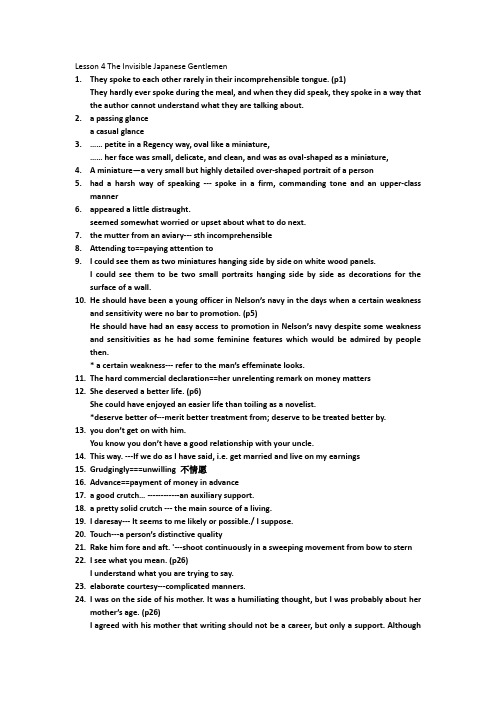
Lesson 4 The Invisible Japanese Gentlemen1.They spoke to each other rarely in their incomprehensible tongue. (p1)They hardly ever spoke during the meal, and when they did speak, they spoke in a way that the author cannot understand what they are talking about.2. a passing glancea casual glance3.…… petite in a Regency way, oval like a miniature,…… her face was small, delicate, and clean, and was as oval-shaped as a miniature,4. A miniature—a very small but highly detailed over-shaped portrait of a person5.had a harsh way of speaking --- spoke in a firm, commanding tone and an upper-classmanner6.appeared a little distraught.seemed somewhat worried or upset about what to do next.7.the mutter from an aviary--- sth incomprehensible8.Attending to==paying attention to9.I could see them as two miniatures hanging side by side on white wood panels.I could see them to be two small portraits hanging side by side as decorations for thesurface of a wall.10.He should have been a young officer in Nelson’s navy in the days when a certain weaknessand sensitivity were no bar to promotion. (p5)He should have had an easy access to promotion in Nelson’s navy despite some weakness and sensitivities as he had some feminine features which would be admired by people then.* a certain weakness--- refer to the man’s effeminate looks.11.The hard commercial declaration==her unrelenting remark on money matters12.She deserved a better life. (p6)She could have enjoyed an easier life than toiling as a novelist.*deserve better of---merit better treatment from; deserve to be treated better by.13.you don’t get on with him.You know you don’t have a good relationship with your uncle.14.This way. ---If we do as I have said, i.e. get married and live on my earnings15.Grudgingly===unwilling 不情愿16.Advance==payment of money in advance17.a good crutch… ------------an auxiliary support.18.a pretty solid crutch --- the main source of a living.19.I daresay--- It seems to me likely or possible./ I suppose.20.Touch---a person’s distinctive quality21.Rake him fore and aft. '---shoot continuously in a sweeping movement from bow to stern22.I see what you mean. (p26)I understand what you are trying to say.23.elaborate courtesy---complicated manners.24.I was on the side of his mother. It was a humiliating thought, but I was probably about hermother’s age. (p26)I agreed with his mother that writing should not be a career, but only a support. Althoughknowing oneself to be old would cause discomfort and embarrassment, I was actually about her mother’s age and therefore quite in a position to advise her and her future. 25.……“the long defeat of doing nothing well”……“the frustration of being unable to write anything good for many years”26.……, by performance and not by promise. (p27)……, by what you have actually written, not by any indication of potential success in you. 27.I didn’t know you’d ever been there. (p29)The polite way of saying “I know you have never been there (so how can you write about a place you don’t know?)28.A fresh eye’s terribly important. (p30)It’s all good to see something new.29.Settle down—live in marriage and behave as if you live there rather than as if you are onlyvisiting30.He ought to know--- He certainly knows.31.we’d go better to marry when you come back.It will be more sensible of us to get married when you come back.32.Said harshly--- Unpleasantly33.The Azure Blue.'--a deep blue color, similar to the color of a clear blue sky (redundant inmeaning)/ the girl has the bad habit of piling up words and phrases,34.awfully decorative—extremely beautiful but not useful; purely ornamental; serving todecorate only35.you simply don’t connect. ----you haven’t got intelligence, you absolutely don’t connectone meaning to author.36.Gave tongue-----spoke37.…… bowed to each other, as though they were blocked in doorway.…… yielded apologetically to each other in such a manner as if they have dumped into each other in a doorway, as one was going out and the other coming in38.he would have fallen an easy victim to the first dark eyes in Naples.--- he would easily havebeen secured by the first Italian woman he met after setting foot ashore.39.Old ages saves us from the realization of a great many fears. (p55)Being old enable we to avoid seeing many unpleasant things happen.40.Abrasive====harsh and annoying to the ear41.evasive: deliberately avoiding the major topic of getting married1.courteous a. characterized by gracious consideration toward others/ polite 谦恭的,有礼的2.blonde a. & n. having golden or pale-coloured hair白肤金发(女子)3.petite a. small, slender, and trim. (used of a girl or woman) 娇小的4.oval n. & a. resembling an egg in shape卵形的/ resembling an ellipse in shape; elliptical椭圆形的5.miniature n. a copy or model that represents or reproduces something in a greatlyreduced size缩小模型,缩微模型6. a small painting executed with great detail, often on a surface such as ivory 微型画7.signet-ring n. signet -- seal图章戒指8.aviary n. a large enclosure for holding birds in confinement 大鸟舍cage9.sensitive a. easily influenced to the attitudes, feelings, or circumstances of others 敏感的10.rake v. aim heavy gunfire along the length of 扫射11.elaborate a. intricate and rich in detail复杂精美的/ complicated/carefully prepared andfinished/ very detailed and complicated12.v. express at greater length or in greater detail 详述13.courtesy n. polite behavior有礼貌的举止行为14.enfeeble v. deprive of strength; make feeble使丧失力量;使虚弱15.snatch v. & n. grasp or seize hastily, eagerly, or suddenly 抢夺16.submit v. give in to the authority, power, or desires of another 服从17.offer as a proposition or contention将…作为意见提出18.simultaneous a. happening, existing, or done at the same time 同时的19.counterpart n. one that closely resembles another 相似物20.abrasive a. harsh and rough in manner 生硬粗暴的21.blurb n. a brief publicity notice, as on a book jacket 简介22.fell victim to---suffered from holding that belief.23.Established himself===caused himself to become24.Take yp---threw up/ quitted。
小学上册第十二次英语第4单元全练全测
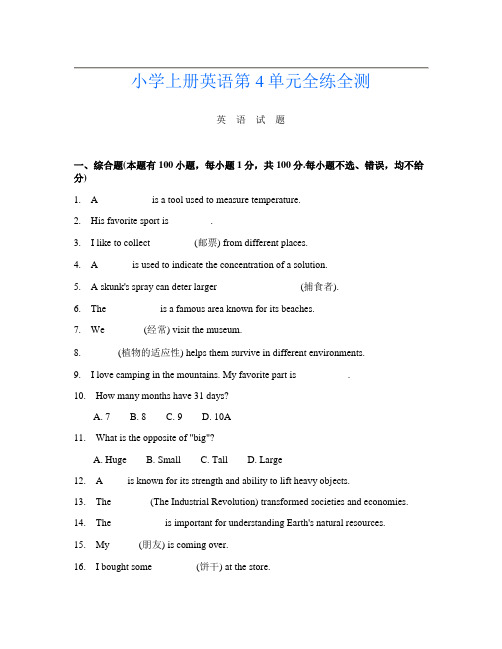
小学上册英语第4单元全练全测英语试题一、综合题(本题有100小题,每小题1分,共100分.每小题不选、错误,均不给分)1. A __________ is a tool used to measure temperature.2.His favorite sport is ________.3.I like to collect ________ (邮票) from different places.4. A ______ is used to indicate the concentration of a solution.5. A skunk's spray can deter larger ________________ (捕食者).6.The __________ is a famous area known for its beaches.7.We _______ (经常) visit the museum.8._____ (植物的适应性) helps them survive in different environments.9.I love camping in the mountains. My favorite part is __________.10.How many months have 31 days?A. 7B. 8C. 9D. 10A11.What is the opposite of "big"?A. HugeB. SmallC. TallD. Large12. A ____ is known for its strength and ability to lift heavy objects.13.The _______ (The Industrial Revolution) transformed societies and economies.14.The __________ is important for understanding Earth's natural resources.15.My _____ (朋友) is coming over.16.I bought some ________ (饼干) at the store.17.Do you know my _____ (表哥)?18.The ____ has a shiny shell found on beaches.19.The hawk can spot its prey from very _________ (远).20.What is the chemical symbol for sodium?A. NaB. SC. SnD. Si21.The element sodium is a ______ metal.22.The __________ (文化多样性) enriches society.23.We can make a ________ from clay.24.What is the main ingredient in chocolate?A. CocoaB. SugarC. MilkD. Vanilla25.The _____ (desk/table) is made of wood.26.The ________ (自然摄影) captures beauty.27.My dad enjoys going to the ____ (movies).28.I call my grandfather _____ (爷爷).29.What is the opposite of "hard"?A. ToughB. SoftC. StrongD. Solid30.My favorite dessert is ________ (冰淇淋).31.My _________ (玩具箱) is filled with memories from my childhood.32.The ancient Greeks practiced _____ as a form of governance.33.I can tell stories with my toy ________ (玩具名称).34.The _____ (大雁) is migrating south for the winter.35.ts can thrive in _____ (阴凉) areas. Some pla36.I enjoy making ________ (手工艺品) for my family.37.What do we call the feeling of being afraid?A. JoyB. FearC. AngerD. SurpriseB38.The kitten is ___ on the couch. (sitting)39.What do we call a person who studies ancient civilizations?A. ArchaeologistB. HistorianC. AnthropologistD. Geologist40.Momentum is the product of an object's mass and its ______ (velocity).41.My __________ (玩具名) is my trusty __________ (名词).42.What is the time of day when the sun rises?A. MorningB. NoonC. EveningD. Night43.The bear forages for food in the _____ forest.44.Photosynthesis occurs in ______ cells.45.My sister has a pet ______ (兔子) named Fluffy.46.My aunt is a talented __________ (作曲家).47.I need to _____ (buy/sell) groceries.48.What do we call the process of water falling from clouds?A. RainB. SnowC. HailD. Sleet49.The __________ is a large region covered by snow and ice. (冰原)50.The fish is _____ (swimming/flying).51.The ________ has soft fur and gentle eyes.52.I enjoy _______ (听故事) before bed.53.What is the name of the famous wizarding author?A. J.R.R. TolkienB. J.K. RowlingC. C.S. LewisD. Roald DahlB54.An example of a renewable energy source is ______ (solar) power.55.I love to watch ______ while I eat dinner.56.Which of these is a dairy product?A. YogurtB. BreadC. RiceD. Pasta57.My sister enjoys __________ (野营).58.What is the primary color of a pumpkin?A. OrangeB. YellowC. GreenD. BrownA59. A polar molecule has regions of _______ charge.60.What is 12 4?A. 6B. 7C. 8D. 9C61.Concentration refers to the amount of solute present in a given _____ of solution.62.What do we call the invisible layer that surrounds the Earth?A. AtmosphereB. StratosphereC. HydrosphereD. LithosphereA63.We have _______ for breakfast.64.I want to travel to ________ (西班牙) someday.65. A solar system consists of a star and the objects that orbit it, including ______.66.What is the term for a baby kangaroo?A. JoeyB. CalfC. KitD. CubA67.The process of crystallization involves forming __________ from a solution.68. Wall of China was built to ______ (保护) the country from invaders. The Grea69.What is the capital of Haiti?A. Port-au-PrinceB. Cap-HaïtienC. Les CayesD. JacmelA70.The __________ (历史的过程) is subject to interpretation.71.What do we call a person who flies airplanes?A. PilotB. EngineerC. MechanicD. StewardessA72.What is the name of the famous ship that sailed in the 1800s?A. MayflowerB. TitanicC. Santa MariaD. USS Constitution73.My uncle is a fun ____.74.What is the capital city of Kenya?A. NairobiB. MombasaC. KisumuD. Nakuru75.What is the main ingredient in a salad?A. FruitB. LettuceC. MeatD. BreadB76.She is drawing a _____ (cat/dog) in her notebook.77.My brother's favorite animal is the ______ (狮子). It is strong and known as the ______ (森林之王).78.I like to ______ (参与) in student leadership roles.79.The cat catches a _______ (猫抓住一只_______).80. A ______ (海狸) builds dams in rivers.81.I love to help my dad with the _______ (我爱帮我爸爸做_______).82.The ____ is a friendly pet that enjoys playing fetch.83.What is the weather like when it rains?A. SunnyB. CloudyC. DryD. WetD84.I enjoy going to the ________ (农场) to see animals.85.I can ________ the piano.86. A turtle can live both in ______ (水) and on land.87.My dad is a skilled ____ (carpenter).88.The _______ can be a beautiful addition to any room.89.I love to ______ (探索) the world around me.90.The dog is ________ (忠诚).91.He plays ______ (足球) with his friends every weekend.92.What do you call a baby horse?A. CalfB. FoalC. KidD. LambB Foal93.The _______ can live for many years.94.Solar panels convert sunlight into _______ energy.95.The __________ (环境保护) of plants is important.96.The ________ was a landmark event in the history of labor rights.97.I play _______ (football) on Sundays.98. A mouse can fit through very ______ (小) holes.99._____ (种子) can be spread by wind or animals.100.The __________ (历史的持久性) reflects stability.。
小学上册T卷英语上册试卷(有答案)
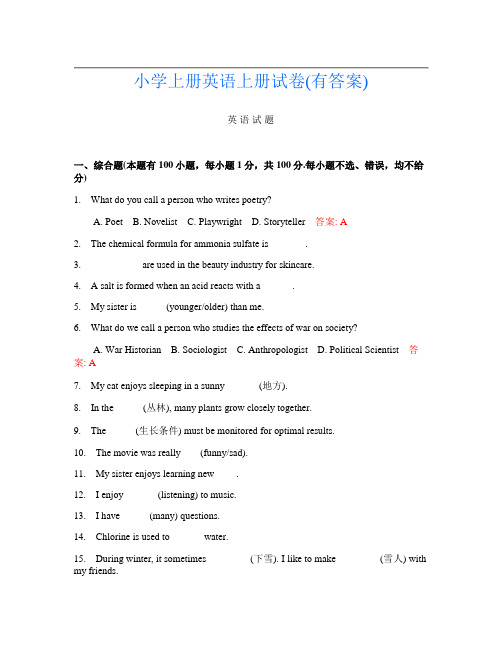
小学上册英语上册试卷(有答案)英语试题一、综合题(本题有100小题,每小题1分,共100分.每小题不选、错误,均不给分)1.What do you call a person who writes poetry?A. PoetB. NovelistC. PlaywrightD. Storyteller答案: A2.The chemical formula for ammonia sulfate is _______.3.__________ are used in the beauty industry for skincare.4. A salt is formed when an acid reacts with a ______.5.My sister is _____ (younger/older) than me.6.What do we call a person who studies the effects of war on society?A. War HistorianB. SociologistC. AnthropologistD. Political Scientist答案: A7.My cat enjoys sleeping in a sunny ______ (地方).8.In the _____ (丛林), many plants grow closely together.9.The _____ (生长条件) must be monitored for optimal results.10.The movie was really ___ (funny/sad).11.My sister enjoys learning new ____.12.I enjoy ______ (listening) to music.13.I have _____ (many) questions.14.Chlorine is used to ______ water.15.During winter, it sometimes ________ (下雪). I like to make ________ (雪人) with my friends.16.The train travels ________ the city.17.The flowers are _____ (beautiful/ugly) in spring.18.Did you see a _______ (小壁虎) climbing on the wall?19.The first successful vaccine was developed for ________ (天花).20. A ______ (龙虾) has pincers and lives in the sea.21._____ (pruning) helps plants grow better.22. A __________ is a geological feature that can impact ecosystems and human activities.23.The chemical formula for hydrogen peroxide is ________.24.The chemical formula for lead(II) sulfide is _____.25.为下列句子选择正确的答语。
小学上册第四次英语第3单元寒假试卷(含答案)

小学上册英语第3单元寒假试卷(含答案)英语试题一、综合题(本题有100小题,每小题1分,共100分.每小题不选、错误,均不给分)1.Metals typically lose electrons to form ______.2.The _______ of an object can be determined by its reactions to forces.3.My sister is ______ (playing) the flute.4.The ______ (植物的生命周期) often involves multiple stages.5.What is the main function of a refrigerator?A. To cook foodB. To freeze foodC. To store foodD. To wash food6.The ________ can be a great companion.7.What is 3 x 3?A. 6B. 7C. 8D. 9答案:D8.What is the color of grass?A. BlueB. GreenC. YellowD. Brown9.I call my family every ____.10.What is the name of the famous mountain in North America?A. Mount RushmoreB. Rocky MountainsC. Appalachian MountainsD. Sierra Nevada答案:B11.What do we call an animal that primarily eats meat?A. HerbivoreB. OmnivoreC. CarnivoreD. Insectivore12.How many sides does a hexagon have?A. FiveB. SixC. SevenD. Eight答案:B13.The anemone is home to the _____ fish.14.What do we call the study of living things?A. PhysicsB. ChemistryC. BiologyD. Geography答案:C15.He likes to play ___. (video games)16.The solid part of a solution that does not dissolve is called a _____.17.My favorite superhero _________ (玩偶) has a cool _________ (披风).18. A chemical reaction that absorbs heat is called ______.19.I have a special ______ (盒子) where I keep all my treasures. It is very ______ (珍贵).20.What do we call a series of mountains?A. RangeB. HillC. ValleyD. Plateau答案:A21. A sheep goes "______."22.My sister's birthday is in . (我妹妹的生日在。
小学上册第二次英语第2单元综合卷

小学上册英语第2单元综合卷英语试题一、综合题(本题有100小题,每小题1分,共100分.每小题不选、错误,均不给分)1.The frog is ___ by the pond. (jumping)2.What is the main ingredient in sushi?A. NoodlesB. RiceC. BreadD. PotatoesB3.What is 5 x 2?A. 7B. 8C. 9D. 104. A chemical reaction can change the properties of ______.5.The cake is _______ (用水果装饰的)。
6. A ________ is very colorful and pretty.7.What is the name of the fairy tale character who lost her glass slipper?A. Snow WhiteB. CinderellaC. Sleeping BeautyD. RapunzelB8.Galaxies can be spiral, elliptical, or ______.9.Mixing vinegar and baking soda produces ______.10.What is the main purpose of a pencil?A. EraseB. DrawC. WriteD. CutC11.The ______ shares interesting facts about science.12.My favorite way to celebrate a birthday is ______.13.The _____ (puzzle) is difficult.14.The Earth's surface is shaped by both internal and ______ processes.15. A ____ has a thick shell and can hide inside for protection.16.We _______ (经常) visit the museum.17.Reactions that absorb energy are called ________ reactions.18.What do we call the imaginary line that divides the Earth into Eastern and Western hemispheres?A. EquatorB. Prime MeridianC. International Date LineD. Tropic of CancerB19.The capital of South Korea is _____.20.I love to _______ (画画) pictures of nature.21.What is the name of the first spacecraft to visit the outer planets?A. Voyager 1B. Pioneer 10C. Mariner 10D. New Horizons22.The process of a solid turning into a liquid is called __________.23.In chemistry, a _______ is a substance that speeds up a reaction without being consumed. (催化剂)24. A _______ is a measure of how much energy is needed to change temperature.25.The flowers are ___ (colorful/plain).26.An example of a noble gas is _______.27.The ________ (湿润) climate suits many plants.28.What is the name of the famous bear created by A.A. Milne?A. PaddingtonB. Winnie-the-PoohC. Yogi BearD. BalooB29.What do you call a young goat?A. KidB. FoalC. CalfD. LambA30.Chemical reactions often produce ______.31.What do we call a large area with many trees?A. ParkB. ForestC. GardenD. Field32.What is the name of the fairy tale character who climbs a beanstalk?A. JackB. JohnC. JimD. JakeA33.I have a pet _______ who likes to jump (我有一只喜欢跳的宠物_______).34.What do bees produce?A. MilkB. HoneyC. SugarD. Butter35.We have a ______ (丰富的) class schedule.36.The particles in a gas are ______ apart.37.What is the name of the superhero who wears a cape and flies?A. BatmanB. Spider-ManC. SupermanD. Iron ManC38.I like to watch ___ (cartoons).39. A chemical formula shows the ratio of _____ in a compound.40.My favorite game is ________.41.The __________ is a large desert located in Australia. (大沙漠)42.What is the name of the popular board game where you buy and sell property?A. MonopolyB. RiskC. ClueD. ScrabbleA43.The __________ is known for its vast empire and military prowess. (罗马帝国)44.The ________ (火灾) in the forest was dangerous.45.The ________ (步道) leads to the waterfall.46.The ______ loves to cook healthy meals.47.The dog is ________ at the door.48.What do we call the written form of a language?A. GrammarB. VocabularyC. ScriptD. LiteratureC49.What is the name of the famous landmark in Sydney?A. Opera HouseB. Harbour BridgeC. Bondi BeachD. Great Barrier ReefA Opera House50.Did you see the _______ (小海豹) basking in the sun?51.What do we call a scientist who studies the structure of the Earth?A. GeologistB. ArchaeologistC. PaleontologistD. Environmental Scientist52.What do we call the study of the mind and behavior?A. PsychologyB. SociologyC. AnthropologyD. PsychiatryA53.What is the name of the famous castle in France?A. Neuschwanstein CastleB. Château de ChambordC. Edinburgh CastleD. Windsor Castle54.The __________ is where animals go to find shelter.55.My uncle is a __________ (外科医生).56.She has a ________ smile.57.Lunar and solar eclipses occur in ______.58.What do you call the study of weather?A. BiologyB. MeteorologyC. AstronomyD. GeographyB59.We have a ______ (校园) festival.60. A wallaby can jump high like a ______ (袋鼠).61.The jellyfish floats in the ______ (海洋).62.The ancient Romans enjoyed _____ as entertainment.63.The ________ was a key event in the history of social reform.64.The _____ (博物馆) has ancient artifacts.65. A neutron has no electric _______.66.What is the term for the amount of space an object occupies?A. MassB. VolumeC. DensityD. WeightB67. A _______ can help illustrate the principles of fluid dynamics.68.The element with the symbol O is __________.69.The __________ (历史的身份认同) shapes group dynamics.70. A chemical that can be oxidized is called a ______.71.What do we call the invisible force that holds us to the Earth?A. FrictionB. GravityC. MagnetismD. PressureB Gravity72.The dog is _______ (digging) in the yard.73. A solution is a homogeneous mixture of a ______ and a solvent.74.My family goes to the ______ every year.75.The chicken clucks when it is _________. (高兴)76.The ancient civilization of Mesopotamia was located between the ________ rivers.77.I like to play games with my toy ________ (玩具名称) during weekends.78.We like to ________ (play) outside.79.My cat enjoys chasing ______ (小虫) in the garden.80.What do we call the line that goes around the Earth?A. EquatorB. LatitudeC. LongitudeD. Meridian81.Chemical reactions are governed by the laws of ______.82.She is ___ (dancing/sitting) on the floor.83.The artist uses _____ (水彩) to paint.84.What do we call the act of teaching someone how to do something?A. InstructionB. EducationC. TrainingD. TutoringC85.In a chemical reaction, energy can be in the form of heat, light, or _____.86.The ________ (桃树) gives us sweet peaches in summer.87.I want to _____ (play/learn) soccer.88.The ________ is a gentle creature.89.I like to plant ______ (花) in the garden.90.The crow is known for its ______ (智慧).91.I can ______ (write) my name in cursive.92.What do you call a large area of land that is inhabited by animals?A. HabitatB. EcosystemC. BiomeD. All of the above93.I saw a ________ in the leaves.94.Flowers need ______ to grow.95. A mountain range is a series of connected ______.96. A ______ (果汁机) can extract healthy drinks from fruits.97.We play _____ (棋类游戏) on weekends.98. A solution is a homogeneous mixture of two or more ______.99.My aunt teaches art at a local ____ (school).100.The chemical formula for methane is __________.。
- 1、下载文档前请自行甄别文档内容的完整性,平台不提供额外的编辑、内容补充、找答案等附加服务。
- 2、"仅部分预览"的文档,不可在线预览部分如存在完整性等问题,可反馈申请退款(可完整预览的文档不适用该条件!)。
- 3、如文档侵犯您的权益,请联系客服反馈,我们会尽快为您处理(人工客服工作时间:9:00-18:30)。
Lesson 4 The Invisible Japanese GentlemenWord List1.courteous a. characterized by gracious consideration toward others/ polite 谦恭的,有礼的2.blonde a. & n. having golden or pale-coloured hair白肤金发(女子)3.petite a. small, slender, and trim. (used of a girl or woman) 娇小的4.Regency n. typical of the period 1810-1820 in England 摄政时期(1811-1820年)a person or group selected to govern in place of a monarch or other ruler whois absent, disabled, or still in minority 摄政者5.oval n. & a. resembling an egg in shape卵形的/ resembling an ellipse in shape; elliptical椭圆形的6.miniature n. a copy or model that represents or reproduces something in a greatlyreduced size缩小模型,缩微模型a small painting executed with great detail, often on a surface such as ivory微型画a. being on a small or greatly reduced scale 小型的7.signet-ring n. signet -- seal图章戒指8.aviary n. a large enclosure for holding birds in confinement 大鸟舍cage9.fiancén. a man engaged to be married 未婚夫10.panel n. a flat, usually rectangular piece forming a raised, recessed, or framed part of thesurface in which it is set 镶板11.sensitivity n.sensitive a. easily influenced to the attitudes, feelings, or circumstances of others 敏感的e.g. She is sensitive to what people think of her. 她很敏感人们对她是怎么想的。
12.paperback n. a book having a flexible paper binding 平装本(hardcover精装本)13.crutch n. a device used for assistance or support 支撑物e.g. to walk on crutches 拄着拐杖走路14.rake v. aim heavy gunfire along the length of 扫射search or examine thoroughly 搜索e.g. rake through the files for the misplaced letter为找一封错放的信而搜找那些文件rake the library for new books在图书馆里寻找新书rake the sky with a searchlight用探照灯扫视天空The clouds raked the mountain summits.云朵掠过山峰。
15.champagne n. 香槟酒16.elaborate a. intricate and rich in detail复杂精美的/ complicated/carefully prepared andfinished/ very detailed and complicatedv. express at greater length or in greater detail 详述e.g. an elaborate lace pattern复杂精美的花边图案The chairman just wanted the facts; you don't need to elaborate on them.主席只想了解事实,你不必作详细说明。
17.courtesy n. polite behavior有礼貌的举止行为courteous a.18.enfeeble v. deprive of strength; make feeble使丧失力量;使虚弱feeble a.e.g. I felt feeble when I was ill. 我生病的时候感到很虚弱。
Grandmother has been getting feebler lately.近来祖母愈益衰弱了。
19.snatch v. & n. grasp or seize hastily, eagerly, or suddenly 抢夺e.g. He snatched up his gun and fired. 他突然取出枪来射击。
He snatched the book from my hands. 他从我的手里抢走了书。
A bird had snatched up the snake from the ground and then dropped it on to the wires.一只飞禽从地上抓起了这条蛇,后来把它丢落在电线上。
snatch at the chance of抓住机会20.decorative a. serving to decorate or embellish; ornamental 装饰性的;装饰的decorate v.decoration n.21.submit v. give in to the authority, power, or desires of another 服从offer as a proposition or contention将…作为意见提出submission n.e.g. refuse to submit to an unjust decision拒绝服从不公正的决定I submitted my papers to the examiner. 我把试卷交给主考老师。
I hope you can submit you term papers before the deadline.我希望你们能在最后限期之前交上你们的学期论文。
submit willingly心悦诚服22.simultaneously ad.simultaneous a. happening, existing, or done at the same time 同时的e.g. This event was almost simultaneous with that one.这件事几乎是与那件事同时发生的。
23.counterpart n. one that closely resembles another 相似物24.Naples n. 那不勒斯(意大利港市)25.abrasive a. harsh and rough in manner 生硬粗暴的26.blurb n. a brief publicity notice, as on a book jacket 简介27.evasive a. inclined or intended to evade 逃避的evade v.e.g. take evasive action采取逃避行动evade responsibility回避责任ThemeIn this sort story, Greene creates the favourable image of a girl, who is not only attractive in looks but also firm in spirit. She has just had her first novel published, and now intoxicated by her success and inflated by the publisher’s praise, she wants to stake her future on a writer’s career. For such a girl, Greene expresses great sympathy and deep concern, himself being a veteran author who knows all the problems and sufferings of being a writer. While he seems to be worrying abut the particular girl, he offers all young would-be writers his reflections on being a writer and his advice to them on choosing other careers than writing.Greene seriously believes that writing requires enormous pains and is never an easy job. A writer may put forth “years of effort” but end up in “doing nothing well”. The girl obviously did not realize this when she set out to write. Beside, writing calls for extremely keen observation. The girl is certainly not up to the job, for she fails to notice even those Japanese gentlemen seatedhighly visibly in an English restaurant. The girl is sure to suffer if she really embarks on a career as a novelist. As an old er person of about her mother’s age, Greene cannot bear to see her, whom he has affectionately portrayed in the story, suffer in her future life. He would like to advise her to take up some other job, because in his words, “she deserves better of life” th en toiling as a professional scribbler.The girl’s fiancé and the Japanese gentlemen have respective roles to play in the story. The man is described as weak in personality and as such, serves as a perfect foil for the girl’s strong character. In several places of the story, the author gives meticulously detailed descriptions of the Japanese gentlemen at the fish dinner. Although the girl is also mentioned as having looked at them on a number of occasions, her glances have never come to anything. In this way, the girl’s exaggerated powers of observation are set well apart from a true writer’s watchfulness. The title of the story epitomizes this meaning.Language Points1.deserve better of --- deserve to be treated better bye.g. I thought I had deserved better of the firm than to be dismissed with so little reason.He has deserved well of his country.他有功于国家。
